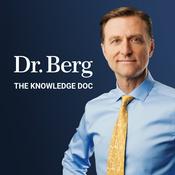The real reason you wake up at 3:00 AM every night is not an adrenal problem. If you’re struggling with insomnia and poor sleep quality, it’s vital to address the real root cause of your sleep problems. In this video, find out how to sleep better with my expert sleep tips so you can stop waking up in the middle of the night.
Try my new castor oil here: 🛒 https://drbrg.co/4tKYHqQ
👉 Get Dr. Berg’s Daily Routine as a free download: https://drbrg.co/45qtO07
If you have a fatty liver, an inflamed liver, or cirrhosis, your liver won’t be able to properly fuel the brain at night. Insulin resistance is the most common reason the liver cannot supply the brain with glucose at night.
If you have a liver problem, you’ll have massive blood sugar swings throughout the night. When insulin lowers this excess blood sugar, adrenaline quickly mobilizes stored sugar, which wakes you up.
The first blood sugar swing is caused by cortisol, and often occurs between midnight and 1 AM. To fix this problem and allow cortisol to spike at the right time, morning sun exposure is vital. You should also begin turning down your inside lights about 3 hours before bed to avoid stimulating more cortisol. Darkness stimulates the production of melatonin, which helps you sleep.
As we age, we lose sleep pressure. Try the following sleep tips to help restore this pressure:
1. Exercise regularly
2. Avoid stimulants
3. Take magnesium glycinate and zinc in the evening
Insulin resistance is often the underlying cause of liver problems, but they can also be caused by consuming seed oils, sugar, and starch. A diet low in choline and sulfur, late-night snacking, and alcohol can also damage the liver.
Some people have sleep problems when they start the keto diet while their brain adjusts from running on glucose to ketones. If this happens to you, try lowering your carbs more gradually.
Try these simple sleep tips to sleep better and stop waking up at night:
1. Stop eating 4 hours before bed
2. Increase choline in the diet: egg yolks, liver, grass-fed meat, salmon, cruciferous vegetables
3. Increase sulfur in the diet: garlic, onion, cruciferous vegetables
4. Support gallbladder health: arugula, dandelion greens, bitter foods, TUDCA
5. Follow a low-carb diet
6. Lower blood sugar: low-carb, ACV, vitamin B1, magnesium, potassium, high-quality protein
Dr. Eric Berg DC Bio:
Dr. Berg, age 60, is a chiropractor who specializes in Healthy Ketosis & Intermittent Fasting. He is the Director of Dr. Berg Nutritionals and author of the best-selling book The Healthy Keto Plan. He no longer practices, but focuses on health education through social media.
Disclaimer:
Dr. Eric Berg received his Doctor of Chiropractic degree from Palmer College of Chiropractic in 1988. His use of “doctor” or “Dr.” in relation to himself solely refers to that degree. Dr. Berg is a licensed chiropractor in Virginia, California, and Louisiana, but he no longer practices chiropractic in any state and does not see patients, so he can focus on educating people as a full-time activity, yet he maintains an active license. This video is for general informational purposes only. It should not be used to self-diagnose, and it is not a substitute for a medical exam, cure, treatment, diagnosis, prescription, or recommendation. It does not create a doctor-patient relationship between Dr. Berg and you. You should not make any change in your health regimen or diet before first consulting a physician and obtaining a medical exam, diagnosis, and recommendation. Always seek the advice of a physician or other qualified health provider with any questions you may have regarding a medical condition.



